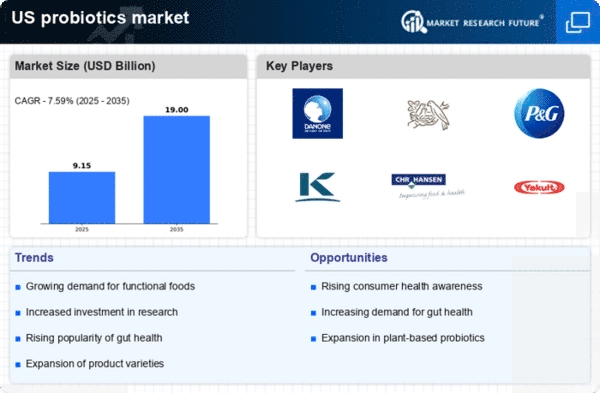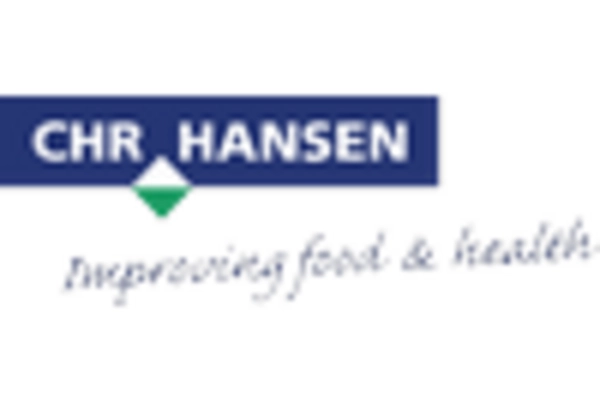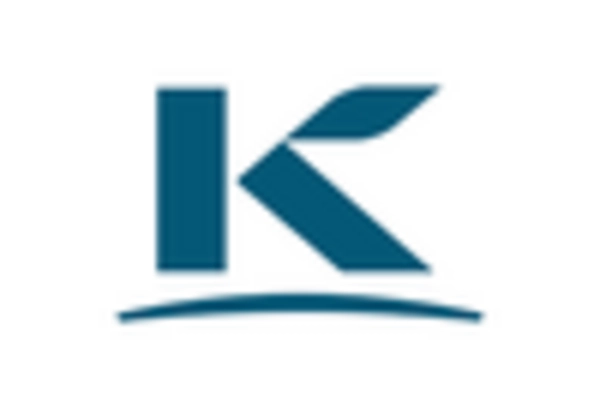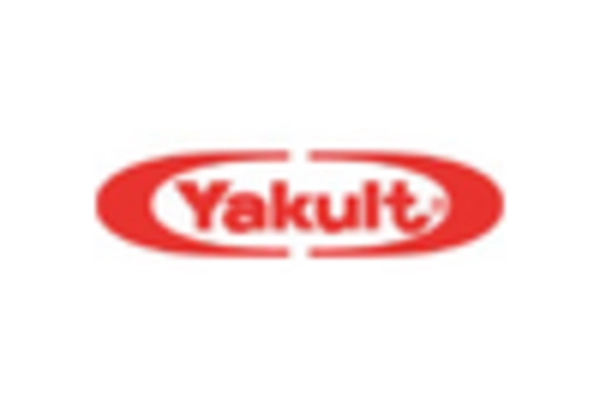Aging Population
The demographic shift towards an aging population in the United States is significantly influencing the probiotics market. Older adults are increasingly seeking natural solutions to manage health issues, particularly those related to digestion and immunity. Probiotics are perceived as a beneficial addition to their diets, potentially alleviating gastrointestinal disorders and enhancing overall health. According to recent data, the segment of consumers aged 60 and above is projected to account for nearly 30% of the probiotics market by 2026. This demographic trend suggests a sustained demand for probiotic products tailored to the needs of older adults, thereby driving growth in the market.
Growing Health Consciousness
The increasing awareness of health and wellness among consumers is a pivotal driver for the probiotics market. As individuals become more informed about the benefits of gut health, there is a noticeable shift towards incorporating probiotics into daily diets. This trend is reflected in the rising sales of probiotic supplements and functional foods, which have seen a growth rate of approximately 8% annually in recent years. Consumers are actively seeking products that promote digestive health, boost immunity, and enhance overall well-being. This heightened focus on health is likely to propel the probiotics market further, as manufacturers respond with innovative formulations and targeted marketing strategies to meet the evolving demands of health-conscious consumers.
Regulatory Support and Guidelines
Regulatory support and clear guidelines from health authorities are playing a crucial role in shaping the probiotics market. The establishment of standards for probiotic products helps ensure safety and efficacy, which in turn boosts consumer confidence. Regulatory bodies are increasingly recognizing the importance of probiotics in health management, leading to more favorable conditions for market growth. For instance, the FDA has provided guidance on labeling and health claims related to probiotics, which aids manufacturers in marketing their products effectively. This supportive regulatory environment is likely to encourage investment and innovation within the probiotics market, further driving its expansion.
Increased Research and Development
The probiotics market is witnessing a surge in research and development activities, which is driving innovation and expanding product offerings. Scientific studies continue to uncover the health benefits of probiotics, leading to a greater understanding of their mechanisms and applications. This influx of research is encouraging companies to invest in developing new probiotic strains and formulations that cater to specific health needs. As a result, the market is becoming increasingly competitive, with a variety of products available to consumers. This focus on R&D not only enhances product efficacy but also builds consumer trust, thereby fostering growth in the probiotics market.
Rising Demand for Functional Foods
The surge in demand for functional foods is a key driver for the probiotics market. Consumers are increasingly looking for foods that offer health benefits beyond basic nutrition, and probiotics fit this criterion perfectly. The market for functional foods, which includes yogurt, kefir, and other probiotic-rich products, is expected to grow at a compound annual growth rate (CAGR) of around 7% over the next few years. This trend is fueled by the desire for convenient, health-promoting options that can easily be integrated into daily diets. As manufacturers innovate and expand their product lines to include probiotics, the market is likely to experience robust growth.
















